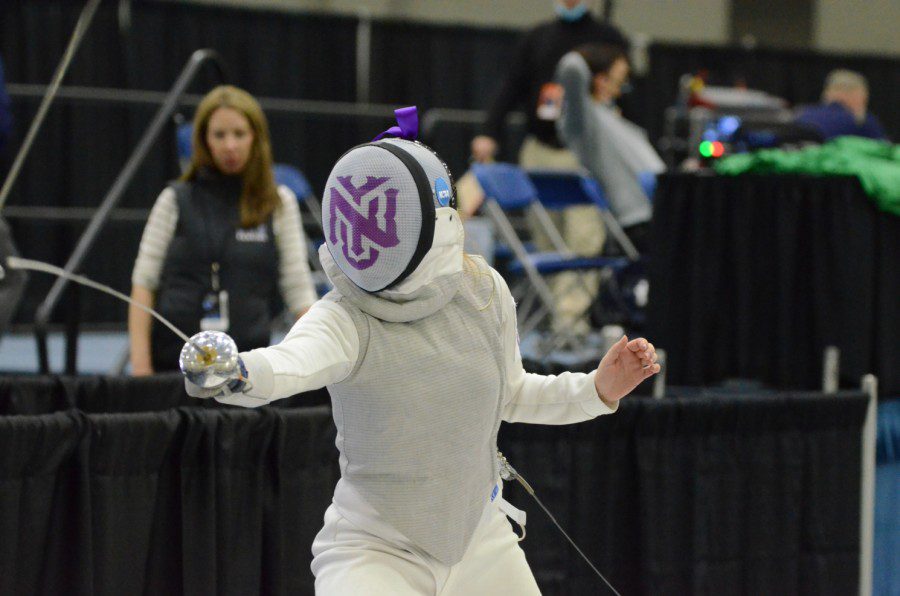Q&A: NYU’s new fencing head coach reflects on first matches of the season
The men’s and women’s fencing teams fared well in their first matches of the season at the Temple University Open.
November 2, 2022
The Division III Violets faced off against Division I fencers, including the No. 2 ranked Columbia University men’s fencing team, at the Temple University Open this past weekend.
For the women’s team, first-year épée fencer Sophia Dondisch advanced the furthest and placed 17th. On the men’s side, junior epee fencer Steven Grams advanced the furthest and placed fifth.
After the tournament, new NYU fencing head coach Ben Bratton reflected on his first competition in leading the team. He discussed his background in the sport, offered insight into how the Temple Open went and shared what he looks forward to for the season.
For the Violet fencers, their next competition is more than a month away at the Sacred Heart Invitation on Dec. 4 in Fairfield, Connecticut. NYU’s men’s fencing team hopes to hold on to their winning streak of 14, while the women’s team hopes to maintain their streak of fives wins.
This interview has been edited for length and clarity.
WSN: Tell me a little about your fencing background. How did you get into fencing? What were some of your favorite moments throughout your career?
Bratton: I’ve been fencing since I was 10 years old. I started fencing at the Peter Westbrook Foundation, a community organization that works with inner-city kids to teach them life skills through fencing.
Peter Westbrook, an NYU alum, is one of the greatest American fencers in history, and began a program that touched countless lives. I was fortunate enough to be one of his kids.
I had a very long and successful competitive career and was a member of seven U.S. national teams. I represented the United States at the Pan-American Games, where I won a Silver medal, and I was also a member of the U.S. Men’s Epee team that won the Senior World Championships in 2012.
WSN: How did you end up at NYU last year as an assistant coach?
Bratton: One of the former NYU assistant coaches, Kornel Udvarhelyi, was my long-time personal coach. When he left the team at the start of last season, I threw my name in as his successor. I really just wanted to help and couldn’t have imagined the trajectory it would put me on.
Being an assistant coach and being the head coach of a program is very different, and I am still learning. As a weapon specific coach, your focus is really on a small subset of the team and directly on the performance of the athletes in your group. As a head coach, you’re responsible for an entire program and all of the constituents that a program is composed of — other coaches, athletes, practice schedules, and equipment as well as the tournaments that the team attends. Everything is a decision that has to be made.
I take all these decisions extremely seriously because I know that student athletes have a unique experience that only lasts four years. It’s important to make that experience as enriching and successful as possible. I think about the coaches that touched me as an athlete a lot and use that to inspire how I interact with the squad.
WSN: How does coaching compare to playing for you?
Bratton: In coaching, I get a lot of the same thrill that I did as an athlete. It is a little bit more difficult as a coach though because I am mostly anxious as I observe.
As an athlete, you just perform and have all of the control over the outcome. As a coach, you hope that you are delivering the correct directives, that the message is communicated well enough to be understood and that you’ve helped the athlete to be able to execute in the moment.
Coaching is an art in itself, and it has been fun to learn how to communicate the experiences that I have had as an athlete to help others achieve their goals.
WSN: How do you think the teams did at the Temple Open? What do you look to improve upon?
Bratton: The team did their best at Temple and our whole team fought for every point. We had fantastic results from Brian Kim and Steven Grams with quarter final finishes, and had a few other athletes knocking on the door.
The event was really a success, though, because after the weekend, I felt like we’ve finally begun to come together as a team. As the weekend progressed, you could feel some of the initial awkwardness at the start of the season dissipate as we got into just supporting one another and cheering for teammates. The outlook is really bright for NYU fencing.
Contact Ethan Rendon at [email protected]























































































































































